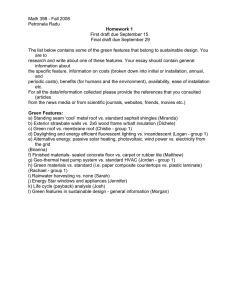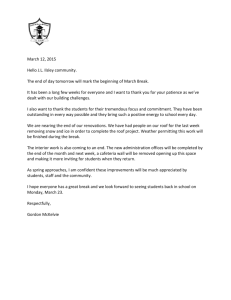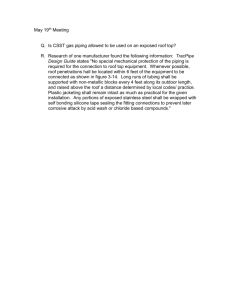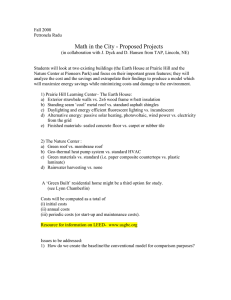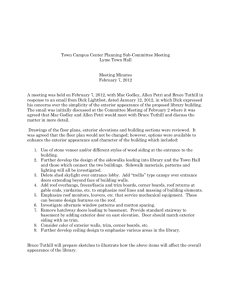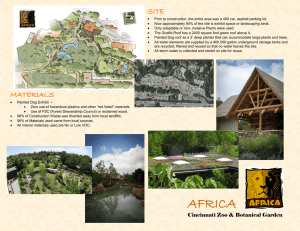The Florida Vernacular Architectural Style
advertisement
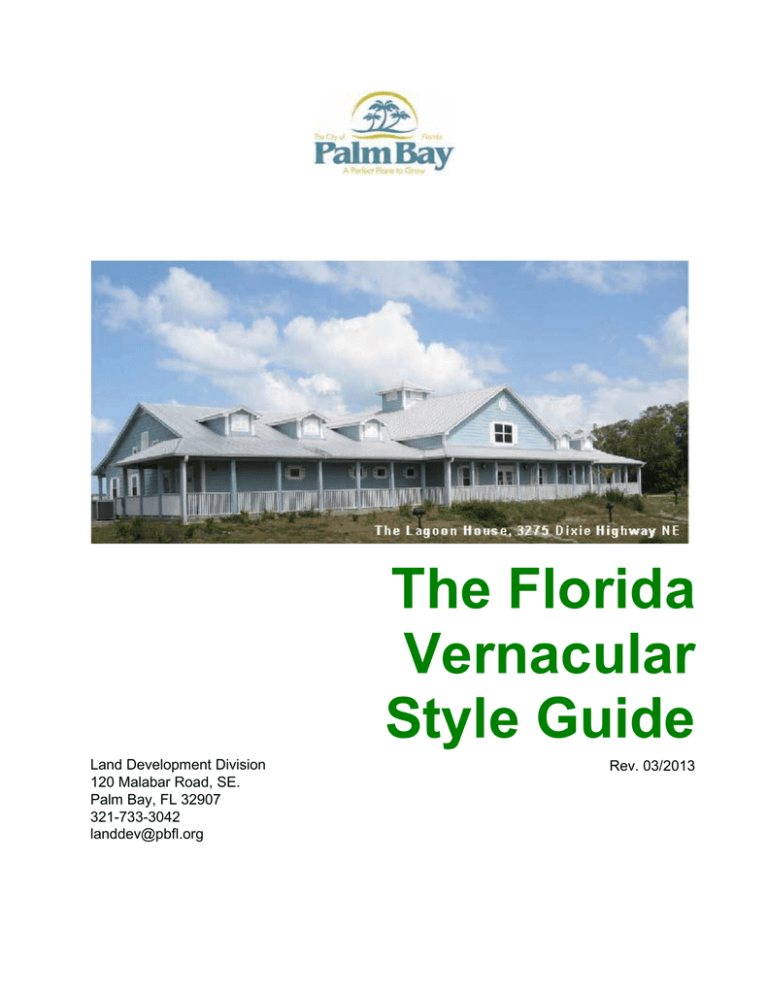
The Florida Vernacular Style Guide Land Development Division 120 Malabar Road, SE. Palm Bay, FL 32907 321-733-3042 landdev@pbfl.org Rev. 03/2013 Guide Contents The Florida Vernacular Architectural Style.................................... 1 Submittal Requirements................................................................ 2 Roofs and Walls............................................................................ 5 Design Requirements.................................................................... 3 Signs............................................................................................. 6 Best Practices - Exterior Lighting.................................................. 7 Porches, Railings and Trim........................................................... 5 Definitions......................................................................................8 Best Practices - Massing and Relief….......................................... 7 Suggested Reading......................................................................10 The Florida Vernacular Architectural Style The City of Palm Bay has adopted by ordinance certain architectural requirements for new commercial buildings, in order to enhance the City's appearance along public corridors. The elements chosen for the Florida Vernacular Architectural Style were selected from the historic design features of the central and south Florida building tradition, such as pastel colors, porches and multi-pitched roof lines, elements originally developed in response to Florida's climate. This guide is intended as a springboard for ideas for architects, engineers, designers and owner/developers to design their building elevations within the City's framework, but is not intended to limit innovative and creative adaptations of the Florida Vernacular Architectural Style elements. It is hoped that this guide will illustrate a general idea of the design elements that the City requires without limiting the design possibilities. Montessori School,1450 Troutman Boulevard NE Submittal Requirements The applicant shall submit a copy of all building elevations and wall sections that face public rightsof-way as part of the site plan review submittal package. A copy of the Florida Vernacular Architectural Style Materials & Finishes form shall also be completed and submitted for review and approval. This form shall include the following information: a. Roofing material - including manufacturer's name, material color and specifications sheet that states warranty information and that clearly describes the material. b. All roof itches. c. All exterior paint colors including trim colors shall have the manufacturer's name and specific color names or identification codes listed. If the color is not in the City's inventory, then a physical sample shall be submitted for approval. d. Siding material including manufacturer's name, material color and specifications sheet that states warranty information and that clearly describes the material. e. Brick shall require a color sample for review and approval. f. Window and storefront frames with powder coat/Kynar 500 or similar finish shall have the color submitted for approval. g. Window tint shall be complimentary to the overall design. The items listed shall be reviewed by the City's architect for compliance with the Florida Vernacular Architectural Style. All interpretations and deviations from the requirements shall be forwarded to the City's architect for approval. The architect shall render a decision within five working days of submittal of the request for an opinion. Requirements of the City's building and life/safety codes will take precedence. WalMart, 1040 Malabar RoadSE Any changes to the approved Materials & Finishes form or to the approved elevations shall be submitted to the City's architect for approval prior to construction. All approvals are subject to meeting the requirements of the applicable City building and life/safety codes. Design Requirements (a) A Florida Vernacular architectural style for each structure is required. This shall include the following architectural elevations facing public rights-of-way: 1) A metal panel 5-seam or metal shake roof is acceptable. A 5-tab twenty-five (25) year dimensional shingle roof or manufactured equivalent of a wood shake roof is acceptable. 3-tab shingles, barrel vaulted tiles or corrugated roof systems are not permissible. 2) Pitch of main roof, hipped or gable, shall be no greater than 5:12; mansard roof shall be no greater than 9:12; porch roof shall be a lower pitch than the main roof. A minimum 6" overhang is required for any roof structure. All structures must have a minimum 3:12 slope roof. Multiple roof systems with matching roof slopes are permissible. Low slopes ("Flat") roof systems are permissible when screened by a mansard roof or parapet wall meeting the design requirements. 3) The predominant exterior color shall be pastel shades or white; earth tones are not acceptable except in brick. 4) Manufactured brick or materials that have the appearance of brick are acceptable. Horizontally struck stucco, exterior insulated finish system stucco panels, board and batten, wood or vinyl siding, and stained hardwood panels shall also be considered acceptable finishes. 5) Front porch. The front porch must encompass an area greater than fifty percent (50%) of the front facade. The porch must be a minimum of 60" in depth. 6) Gingerbread trim and/or porch railings, columns or posts shall have the appearance of light frame wood construction. 7) Trim colors shall be white or light pastels. (Trim shall be considered railings, columns, door and window surrounds, soffits, shutters, gutters and downspouts, and other decorative elements.) Trim finishes shall be of a contrasting lighter color than that of the primary building color with the exception of white as a primary building color. 8) There shall exist no area greater than 400 square feet of contiguous blank wall area on any front facade that remains unadorned by architectural features that include, but are not limited to, windows, doors, lights, banding trim or porch elements. 9) There shall not exist any singular facade that has greater than 100 lineal feet of run without a minimum 16" St. Joseph’s Catholic Church, break, by using a directional or 1402 Miller Street NE material change. 10) Metal-clad structures are permissible. Internal bracing must be certified to accept additional finishes or structures applied to the exterior metal panels. No external "X" bracing is to be visible on any front facade. Finish panels must be able to accept a painted finish. All exterior wall finishes must match the primary building color. The use of corrugated, synthetic or fiberglass panels is prohibited on any front wall or any front roof surface. All design requirements must be met for metal-clad structures as for any other new structure. (b) The predominant exterior color shall be applied to all sides of the structure. (c) The design requirements listed in (a) above shall be applicable to all new construction in the commercial districts prescribed, and in the case of additions or renovations to, or redevelopment of, an existing building or project, where the cost of such addition, renovation or redevelopment exceeds fifty percent (50%) of the value of the existing structure(s). A mirror building, defined as a building meant to complement a pre-existing structure by use of identical material finishes, scale and form, shall be exempt from the design requirements. New buildings that are part of an overall campus plan that has an established, approved architectural theme shall also be exempt from the design requirements herein. (d) The design requirements listed in (a) above shall be applicable to all accessory structures not exempted by (c). Any accessory structure not meeting this requirement shall be screened so as to not be visible from the public right-of-way. Mechanical equipment such as gasoline pumps, air and vacuum machines, drive-through menu boards and speaker stations, drive-through teller stations, ATMs and similar appliances which require direct access by the public shall be exempt from the design review requirements of this section. (e) Compliance with the requirements set forth in this subsection shall be demonstrated by submittal of building front elevations and color and material samples at the time of site plan review. (f) Structures in the following use categories are exempt from the design review requirements of this subsection, including: public utility equipment, commercial towers, hospitals, churches and model home centers. (g) The city-wide Sign Code shall be adhered to with the following exceptions: 1) Materials. The color, construction and material of each sign should be compatible with the architecture on the site. 2) Design. Every sign frame or support shall be designed as a sympathetic architectural element of the building(s) to which it is principally related. 3) Free standing signs shall have landscaping at the base. 4) Free standing signs over twenty-five (25) feet in height shall be exempt from the design review requirements of this subsection but will require landscaping at the base of each sign. (h) Structures having a federal or state historic site status shall be exempt from this subsection. Roofs and Walls A parapet wall, where part of the exterior wall is exposed above the front porch roof line, is not a typical design element used in Florida Vernacular construction. Suitable solutions for a parapet wall are a wall cap or a mansard roof. The cap or roof shall be complementary to the overall design intent of the building. Metal roof finishes shall have a Galvalume, Kynar 500 or equivalent finish. A mansard roof is acceptable provided that the roof slope shall not exceed a 9:12 pitch. Multiple sloped roofs shall be designed so that the upper slope(s) shall be greater than or equal to the lower slope(s). All facades required to meet the architectural code shall have the following elements. Areas of any front facade that are unadorned may not exceed 400 square feet in area. Any area over this size must have design elements to relieve the blank area. Items such as, but not limited to, porches, pilasters, exterior lighting, material or elevation changes, planters, and spandrel glass windows shall be employed to achieve this appearance. Porches, Railings and Trim Porches shall have wood or the appearance of light framed wood columns and railings. Other items such as spandrels and fretwork trim are also required as integral design elements for the porch structure. Vinyl or metal elements are acceptable provided that these materials are appropriately scaled to give the appearance of a wood structure. Colors for finishes shall be white or shades of pastel. Exposed lookout beams shall also have suitable finishes compatible with the porch and other building elements. Colonial Square, 600 Malabar Road NE Railings and balustrades shall have the appearance of wood pickets or ornamental turned or sawn posts and be secured to vertical support columns made from suitable materials such as wood, metal or other structural materials. The design, ornamentation and finish color of the railing shall be sympathetic to the overall design of the structure. All porch and balcony railings and balusters must meet all City of Palm Bay building code requirements. Lattice as a railing element is not acceptable. Trim is an integral element to porch design and is required for all porch facades. The trim shall have the appearance of decorative wood elements and shall be secured to the support beams and/or columns. Trim shall be constructed from wood, metal or other suitable materials. The design and finish color shall be sympathetic to the overall design of the structure. Decorative trim work shall have a color that differs from the main color of the structure. Signs Signs shall be sympathetic to the overall design of the main building. Background materials shall be white or shades of pastel. The frame shall match the exterior building color. Monolithic sign supports shall be similar in size, scale, mass and character of the exterior building elements. Pence Septic Systems, 3160 Dixie Highway NE a. Routed wood signs are acceptable and should be similar to the building colors and materials. b. The sign font shall be sympathetic to the overall building design. c. Gingerbread trim, metal ironwork and decorative finishes are acceptable design elements and are encouraged. d. Lighting of signs shall be incandescent, unless encapsulated by a frame and plastic light box panels. Neon, animated and strobe lighting are not acceptable. e. Landscaping is required around the base of all freestanding signs. f. Handicap and safety/warning signs are exempt from these requirements. g. Traffic and safety control-related signs are exempt from these requirements. h. All signs must meet the City of Palm Bay Sign Code requirements. Best Practices - Exterior Lighting The City recognizes the need for adequate lighting for safety, security and informational purposes (signs). The following practices should be followed in all new lighting systems for structures built on commercially zoned lots in Palm Bay. a. Parking lots shall be illuminated with sufficient lighting for security, and the lumens shall fall to zero at the property line. b. Exterior lighting should be of glare-resistant lenses. Lighting should be recessed into a lighting case, cabinet or soffit wherever possible. c. The use of MV (mercury vapor), HPS (high pressure sodium), LPS (low pressure sodium), or SOX (Sodium oxide) lighting is discouraged for parking lot and building illumination. d. Neon and strip LCD lighting are not acceptable for buildings or sign accents. e. Strobing, UV (ultra violet) or animated lights are prohibited. f. f. Laser lighting or animation, and similar effects are discouraged. g. Landscape lighting is acceptable and encouraged. All lights in this category should be shielded so as to not cause undue glare for adjacent vehicular or pedestrian traffic. h. Light fixtures and cabinets shall complement the building architecture. i. The use of solar, QL (quartz light), white LED and other energy efficient lighting systems is encouraged. Colonial Square, 600 Malabar Road NE Best Practices - Massing and Relief All buildings should have elements to relieve the sense of a solid monolithic mass that complement the scale of surrounding structures and the proposed building. Areas of continuous linear run along a main facade shall have a minimum 16 inch break every one hundred feet. Items such as pilasters, colonnades, angle changes and material changes are suitable methods for obtaining relieve in large buildings. Colonial Square, 600 Malabar Road NE Definitions Balustrade - a type of railing Barrel Vault Tile - a semi-circular roof material made of ceramic or metal, typically used on Mediterranean or Spanish style buildings Chroma - the strength of a color; its saturation, brilliance or purity Color Value - the lightness or darkness of a color against a white background Column - a vertical support Colonnade - an open structure created by a series of columns and/or arches Eaves - the lower part of a roof projection beyond the face of the wall. EIFS - Exterior Insulated Finish System, an interlocking manufactured stucco panel Kroening Buildingg, 2197 Julian Avenue NE Facade - the face or elevation of a building Fascia - a finish board or other material used to cover the ends of roof rafters Gable - the triangular portion of a wall between the enclosing lines of a sloping roof Galvalume - a tin-coated metal panel used in metal roof systems Gingerbread - the ornamental wooden millwork common on many Victorian buildings Hip Roof - a roof in which all sides are roofed from peak to eaves, with no gabled sides, usually rectangular and pyramidal, but may have more than four sides. Kynar - a powder-coated metal finish available in many colors. Lumen - a quantifiable measure of light Mansard - a truncated hip roof, having a flat or nearly flat top Parapet - a vertical wall system used to conceal roof appliances ColonialSquare,600 Malabar Road NE Pastel Color - using the Munsell System for Color Notation, a color having a value of 7 or greater and a chroma of 8 or less Pilaster - a column attached to a wall Porch - an open, floored area covered by a roof, extending along a facade Soffit - the covering panels under a roof overhang, on the eaves Slope - a ratio of length divided by height (example: 3:1 = 3 feet run in length to 1 foot rise in height) Surround - framing elements around a door or window Spandrel - a decorative open panel spanning the space between two columns, below the fascia board Trim - non-structural millwork used to adorn porches, columns, windows and doors Wood Shake - a heavy, dimensional wood shingle Shoppes at Minton, 4250 Minton Road NW Suggested Reading Brooke, Steven. Seaside Gretna, Louisiana. Pelican Publishing Company. 1998 Caemmerer, Alex. The Houses of Key West Sarasota, Florida. Pineapple Press. 1992 Comstock, William T. Victorian Domestic Architectural Plans and Details: 734 Scale Drawings of Doorways, Windows, Stairways, Moldings, Cornices and Other Elements New York. Dover Publications. 1987 Shoppes at Minton,4250 Minton Road NW Haase, Ronald W. Classic Cracker: Florida's Wood-Frame Vernacular Architecture Sarasota, Florida. Pineapple Press 1992 Hunt, Bruce. Visiting Small Town Florida Sarasota, Florida. Pineapple Press. 1997 Lindsay, Leslie. Key West Houses Rizzoli Publications. 1992 Luke, Joy Turner. The New Munsell Student Color Set New York, New York. Fairchild Publications. 1994 MacDonald, Ian. Bermuda: Gardens and Houses Rizzoli Publications. 1996 Munsell, A. H. A Color Notation Baltimore, Maryland. Munsell Color Company. 1975 Salmon, Cleveland. Architectural Design for Tropical Regions Wiley & Sons. 1999 Slesin, Suzanne. Caribbean Style Three Rivers Press. 1999 Land Development Division 120 Malabar Road, SE. Palm Bay, FL 32907 321-733-3042 landdev@pbfl.gog FLORIDA VERNACULAR ARCHITECTURAL STYLE REQUIRED MATERIALS AND FINISHES FORM Per Ordinance #2000-57, all new structures located in commercial zoning districts in the City must undergo an architectural design review to meet the requirements of the Florida Vernacular Architectural Style as so adopted. The materials and finishes as required by ordinance must be reviewed and approved by the City Architect or his designee prior to site plan approval. Any changes to the approved materials and finishes must be approved in writing by the City Architect or their designee. Failure to secure approval will delay the site plan review process. Submit architectural elevations of all sides of the structure(s) that face public rights-of-way. All proposed signs and accessory structure elevations must also be submitted to ensure compatibility. DATE PROJECT NAME ARCHITECT’S NAME TELEPHONE EMAIL __/__/____ SITE PLAN NUMBER # ( FAX NUMBER ( ) - ) - ROOF DESCRIPTION: Provide a explanation of each listed item, providing colors, style, etc. ROOF MANUFACTURER ROOF MATERIAL DESCRIPTION AND COLOR PITCH OF ROOF : EXTERIOR DESCRIPTION:Provide a explanation of each listed item, providing colors, style, etc. EXTERIOR COLOR (include manufacturer name & card #) TRIM COLOR (include manufacturer name & card #) HORIZONTAL SIDING OR EQUIVALENT (include manufacturer name & card #) BRICK (include manufacturer name & card #) FRONT PORCH (must be 60 inches depth) SPANDREL TRIM, LOOKOUT BEAMS, RAILINGS BUILDING ADDITIONS Percentage of New Building Area to Existing Building Area Percentage of New Building Cost to Existing Building Cost % % *******DO NOT FILL OUT FORM BELOW THIS LINE******* A signature below affirms that the architectural elevations required by Palm Bay Ordinance #200057 meet or exceed the minimum design requirements. DATE: ROBERT LORING, ASSOC. AIA/APA / /
